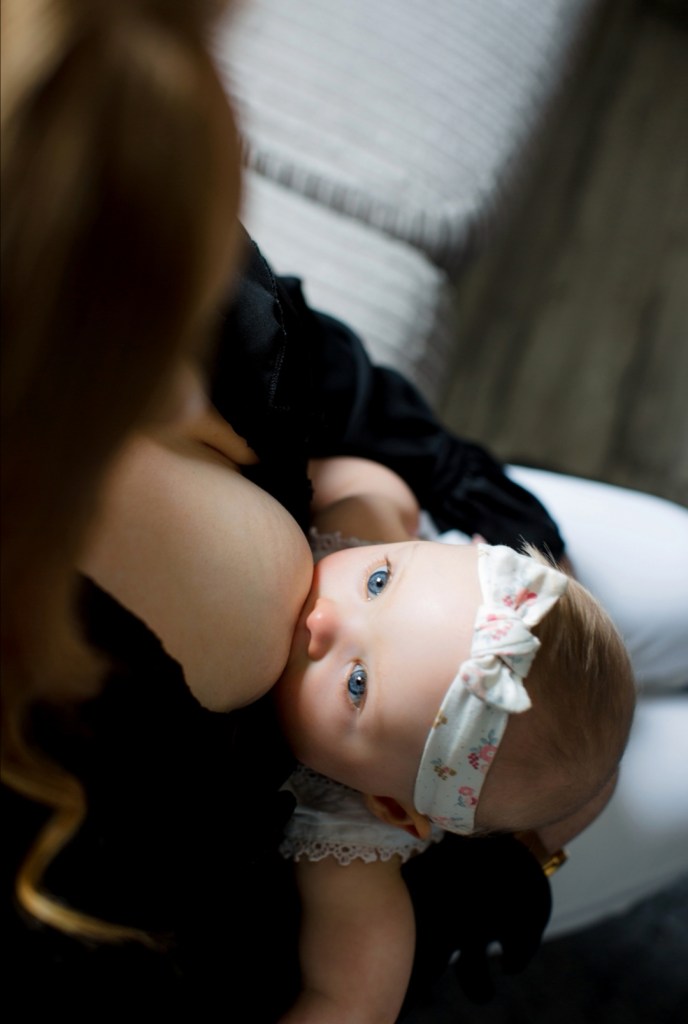Every year on March 21, World Down Syndrome Day is observed to create awareness about Down syndrome. To mark this special day, we have three amazing mamas sharing their experiences of breastfeeding their child with Down Syndrome.
Linzi and Matilda’s story
“After bottle feeding my two eldest children, I knew I wanted to try breastfeeding my third baby. Matilda was born on July 14th, 2019 weighing a tiny 4lb3oz at 36 weeks of pregnancy. Along with the Down Syndrome diagnosis, we also found out she had clubbed feet and a serious heart defect.
We were told that with her having hyptonia (low muscle tone) and her heart issue, that she probably wouldn’t be strong enough to breastfeed. They said her latch may not be correct, that she might tire quickly at the breast, and may not get enough calories. Being told all that really ate away at my confidence.
We were told that with her having hyptonia (low muscle tone) and her heart issue, that she probably wouldn’t be strong enough to breastfeed.
Matilda was NG tube fed for eight weeks with my expressed milk. She had her heart surgery at 13 days old and although it was a success Matilda then went on to develop Necrotising enterocolitis (NEC). This required an extra two weeks stay in hospital (six weeks total).
Some health professionals encouraged us to move onto high-calorie formula because of poor weight gain, but we didn’t give up on breastfeeding. Eventually, around 8/9 weeks after Matilda was born she latched and had her first full breastfeed. From that day on we haven’t had any issues with breastfeeding and Matilda is healthy and thriving!”
Read Linzi’s story in full here.
Laura and Anna-Rose’s story
“Having breastfed my other two babies the intention was to also breastfeed my 3rd. I gained so much confidence, knowledge, and experience during my 2nd breastfeeding journey using online resources and community midwives, that breastfeeding was my ultimate choice. I found out during my pregnancy that my little girl had Trisomy 21 but I knew absolutely nothing about the challenges we could face with feeding due to this.
Anna Rose was born at 37 weeks, measuring on the bottom line of the growth charts. She was tiny, I had never held a baby this small so this was a new experience. However, as soon as Anna Rose was placed onto me after birth she rooted for food and latched instantly with a wide-open mouth and full cheeks.
As soon as Anna Rose was placed onto me after birth she rooted for food and latched instantly with a wide-open mouth and full cheeks.
Anna Rose was extremely ‘floppy’ within her neck, arms and legs requiring as much support as possible but the midwives and her Paediatrician all agreed her latch was perfect. I was able to scoop her up using one hand with her small size helping with feeding positions. I used the rugby and cross-cradle hold feeding positions, these being ones I could never do comfortably with my other babies.
Breastfeeding Anna Rose was not only the most beneficial thing for her but incredibly beneficial for myself. I loved having her so close, feeling that she was being comforted and settled while feeding. Breastfeeding most certainly helped me on my own journey of processing her diagnosis as I had her physically close to me during those moments. I needed her as much as she needed my milk.”
Gemma and Caleb’s story
“Caleb was born in a Midwife Led Unit so when the possibility of him having Down’s Syndrome came to light, he needed a blood test to confirm. This meant just a few hours after he was born, I was bundled into the back of an ambulance beside him. He looked so tiny in his incubator covered in wires. Along with all my fears regarding his health, his future, and what the impact of a Down Syndrome diagnosis would have on our family was also the realisation that this could mean the end of our breastfeeding journey.
I will never forget my “Angel Midwife.” She explained to me that breastfeeding can take a lot of different forms and it doesn’t always mean feeding from the breast. She supported me to express milk as bottles were much easier for Caleb to manage as well as encouraging me to continue to offer short feeds direct from me and lots of skin to skin.
I will never forget my “Angel Midwife.” She explained to me that breastfeeding can take a lot of different forms and it doesn’t always mean feeding from the breast.
We left NICU not only feeling more positive about his future but more confident in our ability to continue our breastfeeding journey.
I naively assumed Caleb’s Down Syndrome diagnosis meant he would be unable to breastfeed, but I am proud to say he is 6 now months old and shows no signs of stopping!”
